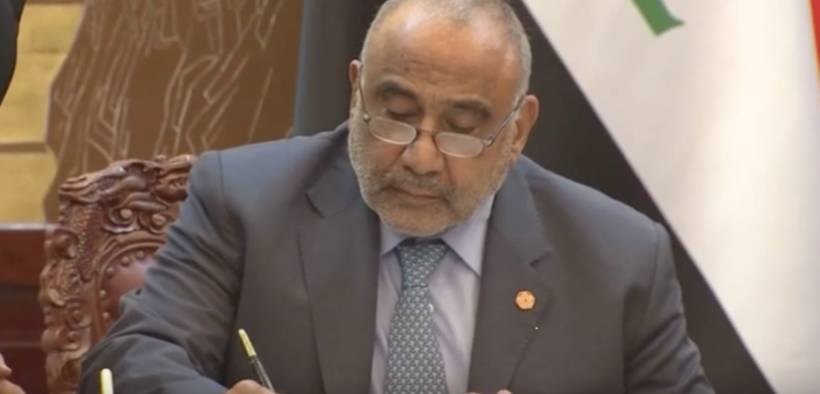How Iran is Losing its Grip on Iraq and Stands Coming Undone

After many protests, some violent, Iraq is stepping away from under Iran’s shadow to establish its own self-governance.
Following an almost irresistible, and admittedly unforeseen, rise to the height of power in the Greater Middle Eastern region in the past decade, the Islamic Republic of Iran is facing its toughest challenge to date at the hands of Shia Islam’s most prominent figure, Ayatollah Ali Sistani.
Iranian by birth, Ayatollah Sistani whose head office is in the holy city of Najaf in Iraq is very much an advocate for Iraqi democracy and self-governance, even if it means pushing the religious out of politics, a move that has left many of his counterparts in Iran somewhat puzzled. In his sermon last Friday the Grand Ayatollah warned that no one person or foreign power (meaning Iran) should impose its will on the Iraqi people.
Sistani also criticized “the abyss of the killings.” Since Oct. 1, when protests across Iraq began, more than 200 protesters have been killed. Various paramilitary groups, many of which are under the direct control of Iran, have arrested thousands and kidnapped dozens.
An unlikely power-broker Ayatollah Sistani has risen today not only as a keeper of Iraqis’ right to political self-determination but also a staunch defender of people’s rights to peacefully demonstrate against state abuses. It is his decision to stand in solidarity with and defense of the Iraqi people, which pits Tehran against Najaf in a showdown that few could have predicted … although some of the writings were already on those proverbial walls.
If Iraq happens to be majority Shia, just like its neighbor, its demographic makeup could not be further removed from that of Iran. And while Iraq may still share some of Iran’s religious idiosyncrasies, it does not share its political ideology – essentially that clerics ought to be the guardians of all state institutions to guarantee the integrity and continuity of the state.
There, as they say, the buck stops.
Iraq Wants to Break Free from the Ayatollahs’ Rule
Iraq never wanted to repeat Iran’s revolutionary experiment. And though the fall of Saddam Hussein marked a historical turning point in Iraq’s political and institutional life, Iraqis never dreamed of replicating Iran’s system of governance. Rather, they very much intended to assert their own by embracing pluralism and secularism, ambitions that have left something to be desired on the ground. But democracy takes time and, more often than not, nations have to endure decades if not centuries of growing pains before finding their footing.
Iraq is doing just that.
Much of Iraq’s failures today: corruption, nepotism, clerical exceptionalism and the existence of mini-states within the state via paramilitary proxies have been blamed on Iran’s overarching influence over Iraqi state institutions.
Interestingly, and most worrying to Iran, has been the geographic origin of Iraq’s discontent. Deep within Iraq’s South, where Shia Islam sits unchallenged, Iraqis have rejected those officials they see as an expression of Iran’s influence, former Prime Minister Adel Abdel Mahdi being top of the list. Iraq’s anger today is not sectarian-based, it is not the result of Western manipulation or an attempt by Islamic radicals to subdue Iraq’s South. Today, Shia Muslims want to rewrite their history by emancipating themselves from the clergy and reaffirming secularism as the basis of their democracy.
As far as Iran is concerned, such a challenge to its hegemony could topple too many dominoes, leaving its regime exposed to American and Israeli wrath. And that Iran will not allow, at least not without a mighty fight.
Forced into an impossible corner by both Iraqis and Iraq’s new champion: Ayatollah Sistani, Prime Minister Mahdi was forced in late November to resign from office. “I will submit to the esteemed parliament a formal letter requesting my resignation from the premiership,” Abdel Mahdi said in a statement. The former PM said he made the decision after listening “with great concern” to a sermon delivered by Grand Ayatollah Sistani as he urged parliament to “reconsider its options” over who should lead the country.
Iran’s answer was swift. Only hours after Mahdi made his decision public Tehran sent its most trusted and decorated military official, Gen. Qasem Soleimani, the man credited for defeating ISIS in both Syria and Iraq to meet with Sistani and orchestrate the return of PM Mahdi, the man Tehran vetted for office. Admired by millions across the region for his military prowess, the general’s charm was lost on Najaf. Sistani’s office sources have confirmed the Grand Ayatollah refused to renege on his position, holding that Iraq’s future was for Iraqis to decide, beyond any and all arguments for religious loyalty and fealty.
Violence as a Tool of Repression
Fears now are that Iran may weaponize its militias to force Iraq to heed its calls for political compliance. It is likely any further escalation of violence will only serve to further reinforce the belief that Iran meddles in Iraq’s affairs, thus fanning popular anger.
A recent report by Human Rights Watch does not bode well as it speaks of politically motivated disappearances and officials’ unwillingness to curb or even address the trend. “At least seven people, including a boy of 16, were reported missing since Oct. 7 from or near Baghdad’s Tahrir Square, where they were participating in ongoing protests in Iraq’s capital,” Human Rights Watch said earlier this month. Four were still missing as of December 2. The families said they visited police stations and government offices seeking information without success, and the government took no tangible measures to locate their relatives. It is unclear whether government security or armed groups carried out the abductions. In another two cases, security forces arrested and arbitrarily held protest supporters.
On Nov. 5, 2019, the United Nations Assistance Mission to Iraq reported that it knew of six abductions of protesters or volunteers helping them in Baghdad. The Iraqi High Commission for Human Rights began tallying the number of people security forces and unknown elements abducted and detained during protests on Oct. 1, but stopped its tally on Oct. 31. However, on Nov. 25 the commission said on Facebook that authorities had arrested 93 protesters in Baghdad between Nov. 21 and 24 – 14 of whom they had released – and noted continued reports of kidnappings of activists, journalists and lawyers by “unknown persons.” On Nov. 21, it said the government should investigate, secure people’s release and bring those responsible to justice.
What happens next is anyone’s guess.








“Foreign power” makes no reference to the USA?
“Weaponuze militias”? Militias are by definition weaponuzed!